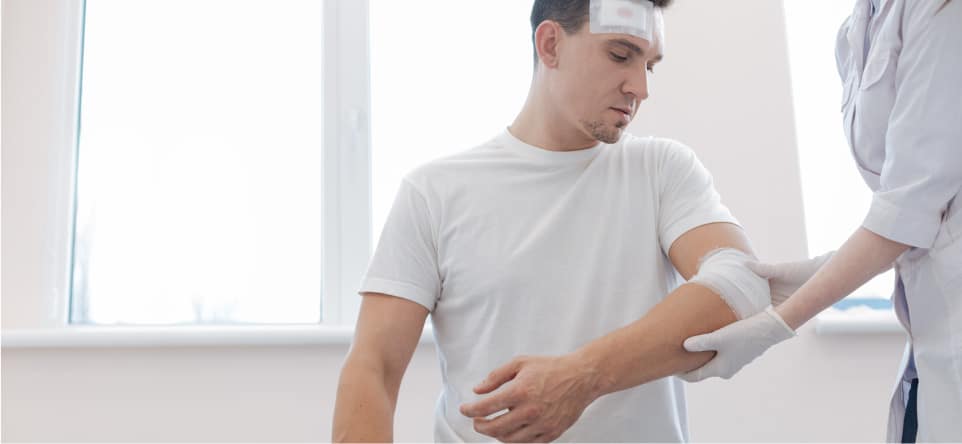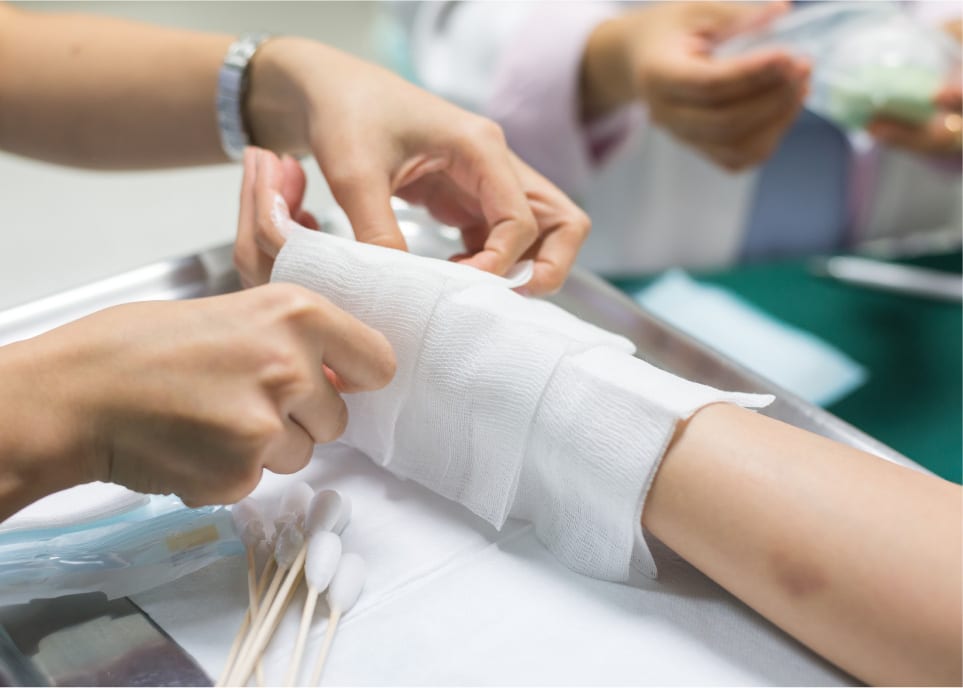Severe Wounds & Cuts: Emergency Care & Treatment
While minor wounds and cuts can be treated at home with basic first aid, more serious wounds and cuts may require emergency care. Proper wound care is important to prevent complications and infections, and to promote healing of the skin.
What is a Wound?
Wounds can be either closed (where the skin stays intact) or open (where the skin is cracked open). A closed wound (or contusion) is often the result of blunt force trauma, which damages the dermis of the skin (bruising – bleeding under the skin). An open wound is usually the result of an injury from falls, accidents with sharp objects or tools, and car accidents, where the skin is torn, cut, or punctured.

How Do You Care for a Closed Wound?
Most closed wounds (such as bruising) can be cared for at home:
Apply an ice pack wrapped in a towel to the area for 20 minutes to decrease pain and swelling
Remove ice and wait for 20 minutes before reapplying
Elevate injured area If you suspect there is a more serious injury besides visible bruising, seek emergency treatment

How Do You Treat an Open Wound?
Some open wounds can be treated at home with basic first aid:
-
Wash and disinfect the wound
-
Apply direct pressure to wound to stop bleeding
-
Elevate injured area to control swelling
-
Wrap wound with sterile dressing or bandage
-
Keep wound clean and dry for 5 days
-
Get plenty of rest
-
Take acetaminophen (Tylenol) as directed on the package for pain
-
Avoid aspirin products as they can cause or prolong bleeding
-
Apply ice for bruising or swelling
When to Seek Emergency Care for Open Wounds?
You should call 911 or seek immediate emergency care if:
-
An open wound is deeper than 1/2 inch
-
The bleeding does not stop with direct pressure
-
The bleeding lasts longer than 20 minutes
-
The bleeding is the result of a serious accident
You should also seek emergency care if you have:
-
Cuts over a joint
-
Cuts that are gaping or jagged
-
Cuts that may impair function of a body area such as an eyelid or lip
-
Cuts from a metal object or a puncture wound
-
Cuts from an animal or human bite
-
Cuts that have damaged underlying nerves, tendons, or joints
-
Cuts over a possible broken bone
-
Cuts from a crushing injury
-
Cuts with an object embedded in them
-
Cuts that remove all of the layers of skin like those from slicing off the tip of a finger
How Are Open Wounds Treated in Emergent Situations?
At The Emergency Center, your doctor will determine the best treatment for your open wound, but generally the doctor will:
-
Clean the affected area
-
Numb the area with an anesthetic
-
Close the wound with skin glue, sutures or stitches
-
Administer a tetanus booster shot (if you have a puncture wound)
-
Administer pain medication and penicillin
In some cases, the doctor may choose not to close the wound and let it heal naturally. In this case, the doctor may pack the wound with gauze. This is done to prevent infections and the formation of abscesses. The doctor may also prescribe penicillin or another antibiotic to treat an infection or if you are at risk for developing an infection.
What Do You Do if a Body Part is Severed?
If you have a severed body part, bring it with you for possible reattachment. Wrap the body part in moist gauze and pack it in ice
How Do You Care for Your Wound at Home?
When you leave The Emergency Center, you will be given instructions for wound care at home. You might have bandages and dressings that will need to be changed periodically. When changing a dressing, always work on a clean surface and wash your hands before and after. Clean the wound as instructed and dry it before reapplying bandages and dressing. Throw away your old bandages and dressings.
Are There Complications from Having an Open Wound?
In having an open wound, you are at risk for infection. Make sure you follow your wound care at home instructions carefully to minimize this risk.
What Are the Signs of An Infection?
When you are at home resting, watch out for any signs of infection, which may include:
-
An increase in drainage
-
Thick green, yellow or brown pus
-
Pus with a foul odor
-
A fever of over 100.4 degrees Fahrenheit for more than 4 hours
-
A tender lump in your groin or armpit
-
A wound that isn’t healing
What Do You Do if You Have An Infection?
If you have an infection, return to The Emergency Center. The doctor will drain or debride (remove damaged or infected tissue to improve healing) the wound, and may prescribe an antibotic if the infection is from bacteria.
How to ensure a positive outcome?
If you have a serious open wound, take quick action, especially if you have a deep cut or if you are bleeding a lot. This will minimize your risk for complications and infection.
What Our Patients are Saying About Us
My visit to the emergency center of San Antonio was amazing. I was seen right away for sciatica pain. Dr. Styskal was amazing. I was treated right away and sent home with my medication. I wish more facilities would practice this without you having to make an additional stop at a pharmacy for medication. I know five stars is the highest I can give but they deserve 100+ stars.
Lizette M. ★★★★★
I was skeptical about going to the Emergency room, because for me ER’s have a bad reputation. My experience here was one of the best experience I’ve ever had. Keith at the front desk was very nice and went above and beyond for me. I forget my insurance card and wanted to know how much my co pay would be. He looked me up with no issue, brought my a wheelchair to ease my pain, as well as started
Mecia T. ★★★★★
My first time coming here, was greeted immediately by Keith and Debbie and helped. When in the back, Nichole wasted no time getting my vitals, checking on how I was feeling, and was super friendly and comforting while doing so. Dr. Erdner was very nice, and informative. Johnny got my CT scan quickly and made the process easy, and fast. All together the staff made my visit a great experience.
Nicole D. ★★★★★
Get Directions To Visit Us
Alamo Ranch
Conroe
